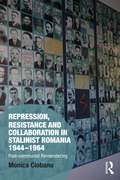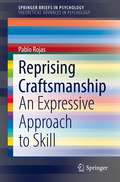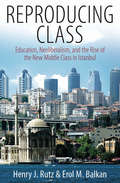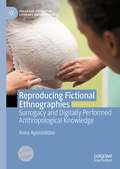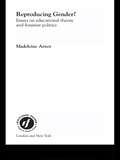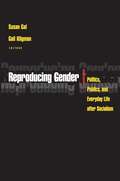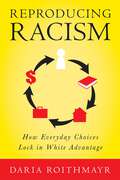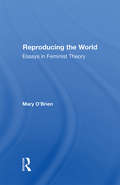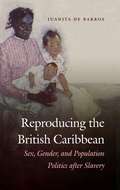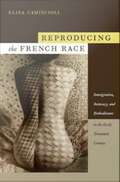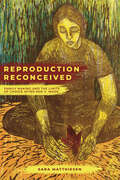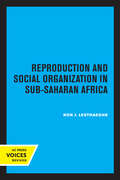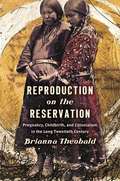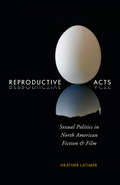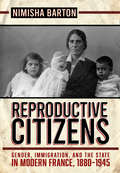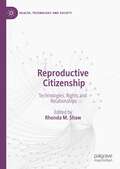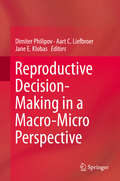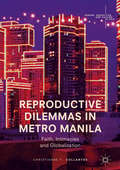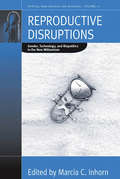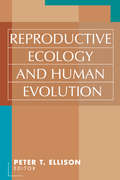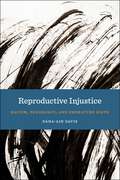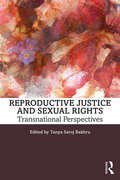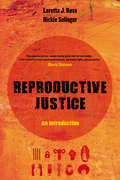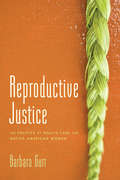- Table View
- List View
Repression, Resistance and Collaboration in Stalinist Romania 1944-1964: Post-communist Remembering (Memory Studies: Global Constellations)
by Monica CiobanuThis book examines how the process of remembering Stalinist repression in Romania has shifted from individual, family, and group representations of lived and witnessed experiences characteristic of the 1990s to more recent and state-sponsored expressions of historical remembrance through their incorporation in official commemorations, propaganda sites, and restorative and compensatory measures. Based on fieldwork dealing with Stalinist repression and memorialization, together with archival research on the secret police (Securitate), it adopts an interdisciplinary approach to reveal the resurfacing of particular themes. As such it draws on concepts from sociology, political science, and legal studies, related to memory, justice, redress, identity, accountability, and reconciliation. A study of competing narratives concerning the meaning of the past as part of a struggle over the legitimacy of the post-communist state, Repression, Resistance, and Collaboration in Stalinist Romania 1944–1964 combines memory studies with a transitional justice approach that will appeal to scholars of sociology, heritage and memory studies, politics, and law.
Reprising Craftsmanship: An Expressive Approach to Skill (SpringerBriefs in Psychology)
by Pablo RojasCraftsmanship provides an insight into an inherently human dimension of work resulting from our immersion in an occupation or profession. The present book illustrates and defines the vital, social, aesthetic, and ethical dimensions involved in craftsmanship, which rejects a dissociation between handwork and wit, or between action and thought. This also contrasts with the neglect contemporary psychology has shown toward craftsmanship and its reduction to mere ‘human factors.’ Drawing on artistry as an emblem, the present account conveys that skilful action can only be renewed in a cycle involving both the personal and the transgenerational. There is little doubt in psychological and anthropological literature that the current global crises cannot be separated from social predicaments; namely, from the commodification of craftsmanship. In this book, the development of skilful action attests to a fundamental involvement required to sustainably perpetuate human endeavours. The role of expressivity in reappropriating technical activity is key in showing the continuous revaluation of our ethics and aesthetics of work, practice, and creation. The overall arc of the volume shows a movement from responsivity to responsibility. In short, if we are to reformulate our relationship to work and craft, we need to see through our responsibility in technique. The particularities of craftsmanship described here aim to contribute to such reformulation.
Reproducing Class
by Henry Rutz Erol M. BalkanMiddle classes are by definition ambiguous, raising all sorts of paradoxical questions, perceived and real, about their power and place relative to those above and below them in a class-structured society. Focusing on families of the new middle class in Istanbul, the authors of this study address questions about the social construction of middle-class reality in the context of the rapid changes that have come about through recent economic growth in global markets and the global diffusion of information technology. After 1980, Turkey saw a structural transformation from state-owned and managed industry, banking, and media and communications to privatization and open markets. The idea of being middle class and the reality of middle-class practices became open for negotiation and interpretation. This study therefore offers a particularly interesting case study of an emergent global phenomenon known as the transnational middle class, characterized by their location of work in globalizing cities, development of transnational social networks, sumptuary consumption habits, and residences in gated communities. As the authors show, this new middle class associates quality education, followed by property and lifestyle issues, with the concept of a comfortable life.
Reproducing Fictional Ethnographies: Surrogacy and Digitally Performed Anthropological Knowledge (Palgrave Studies in Literary Anthropology)
by Anna ApostolidouThis book focuses on the example of surrogate motherhood to explore the interplay between new reproductive technologies and new ethnographic writing technologies. It seeks to interrogate the potential of fictional multimodality in ethnography and to illuminate the generative possibilities of digital artefacts in anthropological research. It also makes a case for the tailor-made character of ethnographic writing in the digital era, arguing that research quests and representational modalities can be paired together to develop unique narrative forms, corresponding to each particular topic’s traits and analytical affordances. Focusing on the intersections of assisted reproduction technologies and digitally mediated writing, this study casts light upon the value of the affective, the fictional and the ‘real’ in the anthropological research and writing of relatedness. Analyzing the situated knowledge of ethnographers and research interlocutors, it experiments with multimodal storytelling and revisits the century-long debate on the affinity between an object of study and the possibilities for its representation. As the first attempt to bring together digital anthropology, fiction writing and the ethnography of surrogacy, this book fuses the genealogy of feminist critique on the orthodox, phallocentric, and heteronormative aspects of academic discourse with the input of digital humanities vis-à-vis troubling the conventional formal properties of scholarly writing.
Reproducing Gender: Critical Essays on Educational Theory and Feminist Politics
by Madeleine ArnotReproducing Gender charts the development of a theory of gender relations built up over the last twenty years. This theory has been highly influential in establishing the importance of the sociology of women's education for the study of society. It demonstrates the power of feminist educational theory and research, and its role in creating new political and academic agendas.This fascinating book explores gender relationships at all levels of schooling. It brings together political, social and cultural theories to understand continuity and change in gender and education. Madeleine Arnot, widely considered to be a pioneer in the field of gender and education, brings together for the first time in a single volume her most influential writings. This book is essential reading for students and academics in the areas of gender studies, women's studies, educational policy, sociology and history of education.
Reproducing Gender: Politics, Publics, and Everyday Life after Socialism
by Susan Gal & Gail KligmanThe striking fact that abortion was among the first issues raised, after 1989, by almost all of the newly formed governments of East Central Europe points to the significance of gender and reproduction in the postsocialist transformations. The fourteen studies in this volume result from a comparative, collaborative research project on the complex relationship between ideas and practices of gender, and political economic change. The book presents detailed evidence about women's and men's new circumstances in eight of the former communist countries, exploring the intersection of politics and the life cycle, the differential effects of economic restructuring, and women's public and political participation. Individual contributions on the former German Democratic Republic, Poland, the Czech Republic, Slovakia, Hungary, Serbia, Romania, and Bulgaria provide rich empirical data and interpretive insights on postsocialist transformation analyzed from a gendered perspective. Drawing on multiple methods and disciplines, these original papers advance scholarship in several fields, including anthropology, sociology, women's studies, law, comparative political science, and regional studies. The analyses make clear that practices of gender, and ideas about the differences between men and women, have been crucial in shaping the broad social changes that have followed the collapse of communism. In addition to the editors, the contributors are Eleonora Zieliãska, Eva Maleck-Lewy, Myra Marx Ferree, Sharon Wolchik, Irene Dölling, Daphne Hahn, Sylka Scholz, Mira Marody, Anna Giza-Poleszczuk, Katalin Kovács, Mónika Váradi, Julia Szalai, Adriana Baban, MaÏgorzata Fuszara, Laura Grunberg, Zorica Mrseviâ, Krassimira Daskalova, Joanna Goven, and Jasmina Lukiâ.
Reproducing Racism: How Everyday Choices Lock In White Advantage
by Daria RoithmayrArgues that racial inequality reproduces itself automatically over time because early unfair advantage for whites has paved the way for continuing advantageThis book is designed to change the way we think about racial inequality. Long after the passage of civil rights laws, blacks and Latinos possess barely a nickel of wealth for every dollar that whites have. Why have we made so little progress?Legal scholar Daria Roithmayr provocatively argues that racial inequality lives on because white advantage functions as a powerful self-reinforcing monopoly, reproducing itself automatically from generation to generation even in the absence of intentional discrimination. Drawing on work in antitrust law and a range of other disciplines, Roithmayr brilliantly compares the dynamics of white advantage to the unfair tactics of giants like AT&T and Microsoft.With penetrating insight, Roithmayr locates the engine of white monopoly in positive feedback loops that connect the dramatic disparity of Jim Crow to modern racial gaps in jobs, housing and education. Wealthy white neighborhoods fund public schools that then turn out wealthy white neighbors. Whites with lucrative jobs informally refer their friends, who refer their friends, and so on. Roithmayr concludes that racial inequality might now be locked in place, unless policymakers immediately take drastic steps to dismantle this oppressive system.
Reproducing The World: Essays In Feminist Theory
by Mary O'BrienThis book offers a small contribution to ongoing feminist struggles to advance and support the reproduction and transformation of collective being-in-the-world. It explores ethnocentrism, preoccupation with theoretical issues, and a celibate indifference to (or repression of) sexual issues.
Reproducing the British Caribbean
by Juanita De BarrosThis innovative book traces the history of ideas and policymaking concerning population growth and infant and maternal welfare in Caribbean colonies wrestling with the aftermath of slavery. Focusing on Jamaica, Guyana, and Barbados from the nineteenth century through the 1930s, when violent labor protests swept the region, Juanita De Barros takes a comparative approach in analyzing the struggles among former slaves and masters attempting to determine the course of their societies after emancipation. Invested in the success of the "great experiment" of slave emancipation, colonial officials developed new social welfare and health policies. Concerns about the health and size of ex-slave populations were expressed throughout the colonial world during this period. In the Caribbean, an emergent black middle class, rapidly increasing immigration, and new attitudes toward medicine and society were crucial factors. While hemispheric and diasporic trends influenced the new policies, De Barros shows that local physicians, philanthropists, midwives, and the impoverished mothers who were the targets of this official concern helped shape and implement efforts to ensure the health and reproduction of Caribbean populations in the decades before independence.
Reproducing the French Race: Immigration, Intimacy, and Embodiment in the Early Twentieth Century
by Elisa CamiscioliIn Reproducing the French Race, Elisa Camiscioli argues that immigration was a defining feature of early-twentieth-century France, and she examines the political, cultural, and social issues implicated in public debates about immigration and national identity at the time. Camiscioli demonstrates that mass immigration provided politicians, jurists, industrialists, racial theorists, feminists, and others with ample opportunity to explore questions of French racial belonging, France's relationship to the colonial empire and the rest of Europe, and the connections between race and national anxieties regarding depopulation and degeneration. She also shows that discussions of the nation and its citizenry consistently returned to the body: its color and gender, its expenditure of labor power, its reproductive capacity, and its experience of desire. Of paramount importance was the question of which kinds of bodies could assimilate into the "French race. " By focusing on telling aspects of the immigration debate, Camiscioli reveals how racial hierarchies were constructed, how gender figured in their creation, and how only white Europeans were cast as assimilable. Delving into pronatalist politics, she describes how potential immigrants were ranked according to their imagined capacity to adapt to the workplace and family life in France. She traces the links between racialized categories and concerns about industrial skills and output, and she examines medico-hygienic texts on interracial sex, connecting those to the crusade against prostitution and the related campaign to abolish "white slavery," the alleged entrapment of (white) women for sale into prostitution abroad. Camiscioli also explores the debate surrounding the 1927 law that first made it possible for French women who married foreigners to keep their French nationality. She concludes by linking the Third Republic's impulse to create racial hierarchies to the emergence of the Vichy regime.
Reproduction Reconceived: Family Making and the Limits of Choice after Roe v. Wade (Reproductive Justice: A New Vision for the 21st Century #5)
by Sara MatthiesenThe landmark case Roe v. Wade redefined family: it is now commonplace for Americans to treat having children as a choice. But the historic decision also coincided with widening inequality, an ongoing trend that continues to make choice more myth than reality. In this new and timely history, Matthiesen shows how the effects of incarceration, for-profit healthcare, disease, and poverty have been worsened by state neglect, forcing most to work harder to maintain a family.
Reproduction and Social Organization in Sub-Saharan Africa (Studies in Demography #4)
by Ron J. LesthaegheUnlike most Asian and Latin American countries, sub-Saharan Africa has seen both an increase in population growth rates and a weakening of traditional patterns of child-spacing since the 1960s. It is tempting to conclude that sub-Saharan countries have simply not reached adequate levels of income, education, and urbanization for a fertility decline to occur. This book argues, however, that such a socioeconomic threshold hypothesis will not provide an adequate basis for comparison. These authors take the view that any reproductive regime is also anchored to a broader pattern of social organization, including the prevailing modes of production, rules of exchange, patterns of religious systems, kinship structure, division of labor, and gender roles. They link the characteristic features of the African reproductive regime with regard to nuptiality, polygyny, breastfeeding, postpartum abstinence, sterility, and child-fostering to other specifically African characteristics of social organization and culture. Substantial attention is paid to the heterogeneity that prevails among sub-Saharan societies and considerable use is made, therefore, of interethnic comparisons. As a result the book goes considerably beyond mere demographic description and builds bridges between demography and anthropology or sociology. This title is part of UC Press's Voices Revived program, which commemorates University of California Press’s mission to seek out and cultivate the brightest minds and give them voice, reach, and impact. Drawing on a backlist dating to 1893, Voices Revived makes high-quality, peer-reviewed scholarship accessible once again using print-on-demand technology. This title was originally published in 1989.
Reproduction on the Reservation: Pregnancy, Childbirth, and Colonialism in the Long Twentieth Century (Critical Indigeneities Ser.)
by Brianna TheobaldThis book documents the transformation of reproductive practices and politics on Indian reservations from the late nineteenth century to the present, integrating a localized history of childbearing, motherhood, and activism on the Crow Reservation in Montana with an analysis of trends affecting Indigenous women more broadly. As the author illustrates, the federal government and local authorities have long sought to control Indigenous families and women's reproduction, using tactics such as coercive sterilization and removal of Indigenous children into the white foster care system. But she examines women's resistance, showing how they have worked within families, tribal networks, and activist groups to confront these issues. Blending local and intimate family histories with the histories of national movements such as WARN (Women of All Red Nations), the author links the federal government's intrusion into Indigenous women's reproductive and familial decisions to the wider history of eugenics and the reproductive rights movement. She argues convincingly that colonial politics have always been--and remain--reproductive politics. By looking deeply at one tribal nation over more than a century, the author offers an especially rich analysis of how Indigenous women experienced pregnancy and motherhood under evolving federal Indian policy. At the heart of this history are the Crow women who displayed creativity and fortitude in struggling for reproductive self-determination.
Reproductive Acts
by Heather LatimerForty years after Roe v. Wade, it is evident that the ideologies of "choices" and "rights," which have publicly framed reproductive politics in North America since the landmark legal decision, have been inadequate in making sense of the topic's complexities. In Reproductive Acts, Heather Latimer investigates what contemporary fiction and film can tell us about the divisive nature of these politics, and demonstrates how fictional representations of reproduction allow for readings of reproductive politics that are critical of the terms of the debate itself. In an innovative argument about the power of fiction to engage and shape politics, Latimer analyzes works by authors such as Margaret Atwood, Kathy Acker, Toni Morrison, Larissa Lai, and director Alfonso Cuarón, among others, to claim that the unease surrounding reproduction, particularly the abortion debate, has increased both inside and outside the US over the last forty years. Fictional representation, Latimer argues, reveals reproductive politics to be deeply connected to cultural anxieties about gender, race, citizenship, and sexuality - anxieties that cannot be contained under the rules of individual rights or choices. Striking a balance between fictional, historical, and political analysis, Reproductive Acts makes a compelling argument for the vital role narrative plays in how we make sense of North American reproductive politics.
Reproductive Acts: Sexual Politics in North American Fiction and Film
by Heather LatimerForty years after Roe v. Wade, it is evident that the ideologies of "choices" and "rights," which have publicly framed reproductive politics in North America since the landmark legal decision, have been inadequate in making sense of the topic's complexities. In Reproductive Acts, Heather Latimer investigates what contemporary fiction and film can tell us about the divisive nature of these politics, and demonstrates how fictional representations of reproduction allow for readings of reproductive politics that are critical of the terms of the debate itself. In an innovative argument about the power of fiction to engage and shape politics, Latimer analyzes works by authors such as Margaret Atwood, Kathy Acker, Toni Morrison, Larissa Lai, and director Alfonso Cuarón, among others, to claim that the unease surrounding reproduction, particularly the abortion debate, has increased both inside and outside the US over the last forty years. Fictional representation, Latimer argues, reveals reproductive politics to be deeply connected to cultural anxieties about gender, race, citizenship, and sexuality - anxieties that cannot be contained under the rules of individual rights or choices. Striking a balance between fictional, historical, and political analysis, Reproductive Acts makes a compelling argument for the vital role narrative plays in how we make sense of North American reproductive politics.
Reproductive Citizens: Gender, Immigration, and the State in Modern France, 1880–1945
by Nimisha BartonIn the familiar tale of mass migration to France from 1880 onward, we know very little about the hundreds of thousands of women who formed a critical part of those migration waves. In Reproductive Citizens, Nimisha Barton argues that their relative absence in the historical record hints at a larger and more problematic oversight—the role of sex and gender in shaping the experiences of migrants to France before the Second World War. Barton's compelling history of social citizenship demonstrates how, through the routine application of social policies, state and social actors worked separately toward a shared goal: repopulating France with immigrant families. Filled with voices gleaned from census reports, municipal statistics, naturalization dossiers, court cases, police files, and social worker registers, Reproductive Citizens shows how France welcomed foreign-born men and women—mobilizing naturalization, family law, social policy, and welfare assistance to ensure they would procreate, bearing French-assimilated children. Immigrants often embraced these policies because they, too, stood to gain from pensions, family allowances, unemployment benefits, and French nationality. By striking this bargain, they were also guaranteed safety and stability on a tumultuous continent.Barton concludes that, in return for generous social provisions and refuge in dark times, immigrants joined the French nation through marriage and reproduction, breadwinning and child-rearing—in short, through families and family-making—which made them more French than even formal citizenship status could.
Reproductive Citizenship: Technologies, Rights and Relationships (Health, Technology and Society)
by Rhonda M. ShawThis book addresses responses to the predicament of medical and social infertility. It draws on international research to examine the dimensions of reproductive citizenship in relation to decision-making about a range of issues: from fertility preservation and the desirability of family creation as a normative expectation of social participation, to how families manage and negotiate engagement with providers of reproductive materials and services around information disclosure and contact, and how they consider their social obligations and responsibilities in relation to the use of assisted reproductive technology (ART).
Reproductive Decision-Making in a Macro-Micro Perspective
by Dimiter Philipov Aart C. Liefbroer Jane E. KlobasThis book provides new insights into the significant gap that currently exists between desired and actual fertility in Europe. It examines how people make decisions about having children and demonstrates how the macro-level environment affects micro-level decision-making. Written by an international team of leading demographers and psychologists, the book presents the theoretical and methodological developments of a three-year, European Commission-funded project named REPRO (Reproductive Decision-Making in a Macro-Micro Perspective). It also provides an overview of the research conducted by REPRO researchers both during and after the project. The book examines fertility intentions from quantitative and qualitative perspectives, demonstrates how the macro-level environment affects micro-level decision-making, and offers a multi-level analysis of fertility-related norms across Europe. Overall, this book offers insight into how people make decisions to have children, when they are most likely to act on their decisions, and how different social and policy settings affect their decisions and actions. It will appeal to researchers, graduate students, and policy advisors with an interest in fertility, demography, and life-course decision making.
Reproductive Dilemmas in Metro Manila
by Christianne F. CollantesThis text addresses the Philippines' historical and contemporary reproductive politics, offering a timely insight into the rich reproductive lives of Filipinos. It critically explores stories of sexuality, religiosity, and reproductive livelihoods during the immediate aftermath of the passing of the 'Responsible Parenthood and Reproductive Health Act' of 2012 after more than fifteen years of opposition by the Philippine Catholic Church. Commonly called the "RH Law", it aims to provide public access to reproductive and family planning services for Filipino women and men, especially those from poorer communities who often experience unwanted pregnancies, complications from illegal abortions, and exacerbated economic hardship. This book explores the intimate and urban after-effects of globalization, and how they shape the "reproductive dilemmas" of Filipinos in Metropolitan "Metro" Manila. It constructs a balanced portrait of the country's reproductive politics within Metro Manila's rapidly changing terrains, showing how "reproductive dilemmas" are produced within a context that is at once fraught by conservative religious discourse and also rapidly globalizing, and where aspects of intimate lives have become both transnational and fragmented.
Reproductive Disruptions
by Marcia C. InhornNominated for the 2007 Book Prize by the Council on Anthropology and Reproduction (AAA) Reproductive disruptions, such as infertility, pregnancy loss, adoption, and childhood disability, are among the most distressing experiences in people's lives. Based on research by leading medical anthropologists from around the world, this book examines such issues as local practices detrimental to safe pregnancy and birth; conflicting reproductive goals between women and men; miscommunications between pregnant women and their genetic counselors; cultural anxieties over gamete donation and adoption; the contested meanings of abortion; cultural critiques of hormone replacement therapy; and the globalization of new pharmaceutical and assisted reproductive technologies. This breadth - with its explicit move from the "local" to the "global," from the realm of everyday reproductive practice to international programs and policies - illuminates most effectively the workings of power, the tensions between women's and men's reproductive agency, and various cultural and structural inequalities in reproductive health.
Reproductive Ecology and Human Evolution (Evolutionary Foundations Of Human Behavior Ser.)
by Peter T. EllisonThe study of human reproductive ecology represents an important new development in human evolutionary biology. Its focus is on the physiology of human reproduction and evidence of adaptation, and hence the action of natural selection, in that domain. But at the same time the study of human reproductive ecology provides an important perspective on the historical process of human evolution, a lens through which we may view the forces that have shaped us as a species. In the end, all actions of natural selection can be reduced to variation in the reproductive success of individuals.Peter Ellison is one of the pioneers in the fast growing area of reproductive ecology. He has collected for this volume the research of thirty-one of the most active and influential scientists in the field. Thanks to recent noninvasive techniques, these contributors can present direct empirical data on the effect of a broad array of ecological, behavioral, and constitutional variables on the reproductive processes of humans as well as wild primates. Because biological evolution is cumulative, however, organisms in the present must be viewed as products of the selective forces of past environments. The study of adaptation thus often involves inferences about formative ecological relationships that may no longer exist, or not in the same form. Making such inferences depends on carefully weighing a broad range of evidence drawn from studies of contemporary ecological variation, comparative studies of related taxonomies, and paleontological and genetic evidence of evolutionary history. The result of this inquiry sheds light not only on the functional aspects of an organism's contemporary biology but also on its evolutionary history and the selective forces that have shaped it through time.Encompassing a range of viewpoints--controversy along with consensus--this far-ranging collection offers an indispensable guide for courses in biological anthropology, human biology, and primatology, along with
Reproductive Injustice: Racism, Pregnancy, and Premature Birth (Anthropologies of American Medicine: Culture, Power, and Practice #7)
by Dána-Ain DavisWinner, 2020 Senior Book Prize, given by the Association of Feminist AnthropologyWinner, 2020 Eileen Basker Memorial Prize, given by the Society for Medical AnthropologyHonorable Mention, 2020 Victor Turner Prize in Ethnographic Writing, given by the Society for Humanistic AnthropologyFinalist, 2020 PROSE Award in the Sociology, Anthropology and Criminology category, given by the Association of American PublishersA troubling study of the role that medical racism plays in the lives of Black women who have given birth to premature and low birth weight infantsBlack women have higher rates of premature birth than other women in America. This cannot be simply explained by economic factors, with poorer women lacking resources or access to care. Even professional, middle-class Black women are at a much higher risk of premature birth than low-income white women in the United States. Dána-Ain Davis looks into this phenomenon, placing racial differences in birth outcomes into a historical context, revealing that ideas about reproduction and race today have been influenced by the legacy of ideas which developed during the era of slavery.While poor and low-income Black women are often the “mascots” of premature birth outcomes, this book focuses on professional Black women, who are just as likely to give birth prematurely. Drawing on an impressive array of interviews with nearly fifty mothers, fathers, neonatologists, nurses, midwives, and reproductive justice advocates, Dána-Ain Davis argues that events leading up to an infant’s arrival in a neonatal intensive care unit (NICU), and the parents’ experiences while they are in the NICU, reveal subtle but pernicious forms of racism that confound the perceived class dynamics that are frequently understood to be a central factor of premature birth.The book argues not only that medical racism persists and must be considered when examining adverse outcomes—as well as upsetting experiences for parents—but also that NICUs and life-saving technologies should not be the only strategies for improving the outcomes for Black pregnant women and their babies. Davis makes the case for other avenues, such as community-based birthing projects, doulas, and midwives, that support women during pregnancy and labor are just as important and effective in avoiding premature births and mortality.
Reproductive Justice and Sexual Rights: Transnational Perspectives
by Tanya Saroj BakhruThis book takes an intersectional, interdisciplinary, and transnational approach, presenting work that will provide the reader with a nuanced and in-depth understanding of the role of globalization in the sexual and reproductive lives of gendered bodies in the 21st century. Reproductive Justice and Sexual Rights: Transnational Perspectives draws on reproductive justice and transnational feminism as frameworks to explore and make sense of the reproductive and sexual experiences of various groups of women and marginalized people around the world. Interactions between globalization, feminism, reproductive justice, and sexual rights are explored within human rights and transnational feminist paradigms. This book includes case studies from Mexico, Ireland, Uganda, Colombia, Taiwan, and the United States. The edited collection presented here is intended to provide academics and students with a challenging and thought-provoking look into sexual and reproductive health matters from across the globe. In this way, the work presented in this volume will help the reader understand their own reproductive and sexual experiences in a more nuanced and contextualized way that links individuals and communities to each other in a quest for justice and liberation.
Reproductive Justice: An Introduction (Reproductive Justice: A New Vision for the 21st Century #1)
by Rickie Solinger Loretta J. RossReproductive Justice is a first-of-its-kind primer that provides a comprehensive yet succinct description of the field. Written by two legendary scholar-activists, Reproductive Justice introduces students to an intersectional analysis of race, class, and gender politics. Clearly showing how reproductive justice is a political movement of reproductive rights and social justice, the authors illuminate how, for example, a low-income, physically disabled woman living in West Texas with no viable public transportation, healthcare clinic, or living-wage employment opportunities faces a complex web of structural obstacles as she contemplates her sexual and reproductive intentions. Putting the lives and lived experience of women of color at the center of the book and using a human rights analysis, Loretta J. Ross and Rickie Solinger show how the discussion around reproductive justice differs significantly from the pro-choice/anti-abortion debates that have long dominated the headlines and mainstream political conflict. In a period in which women's reproductive lives are imperiled, Reproductive Justice provides an essential guide to understanding and mobilizing around women's human rights in the twenty-first century. Reproductive Justice: A New Vision for the Twenty-First Century publishes works that explore the contours and content of reproductive justice. The series will include primers intended for students and those new to reproductive justice as well as books of original research that will further knowledge and impact society. Learn more at www. ucpress. edu/go/reproductivejustice.
Reproductive Justice: The Politics of Health Care for Native American Women
by Barbara GurrIn Reproductive Justice, sociologist Barbara Gurr provides the first analysis of Native American women's reproductive healthcare and offers a sustained consideration of the movement for reproductive justice in the United States.The book examines the reproductive healthcare experiences on Pine Ridge Reservation, home of the Oglala Lakota Nation in South Dakota--where Gurr herself lived for more than a year. Gurr paints an insightful portrait of the Indian Health Service (IHS)--the federal agency tasked with providing culturally appropriate, adequate healthcare to Native Americans--shedding much-needed light on Native American women's efforts to obtain prenatal care, access to contraception, abortion services, and access to care after sexual assault. Reproductive Justice goes beyond this local story to look more broadly at how race, gender, sex, sexuality, class, and nation inform the ways in which the government understands reproductive healthcare and organizes the delivery of this care. It reveals why the basic experience of reproductive healthcare for most Americans is so different--and better--than for Native American women in general, and women in reservation communities particularly. Finally, Gurr outlines the strengths that these communities can bring to the creation of their own reproductive justice, and considers the role of IHS in fostering these strengths as it moves forward in partnership with Native nations. Reproductive Justice offers a respectful and informed analysis of the stories Native American women have to tell about their bodies, their lives, and their communities.
